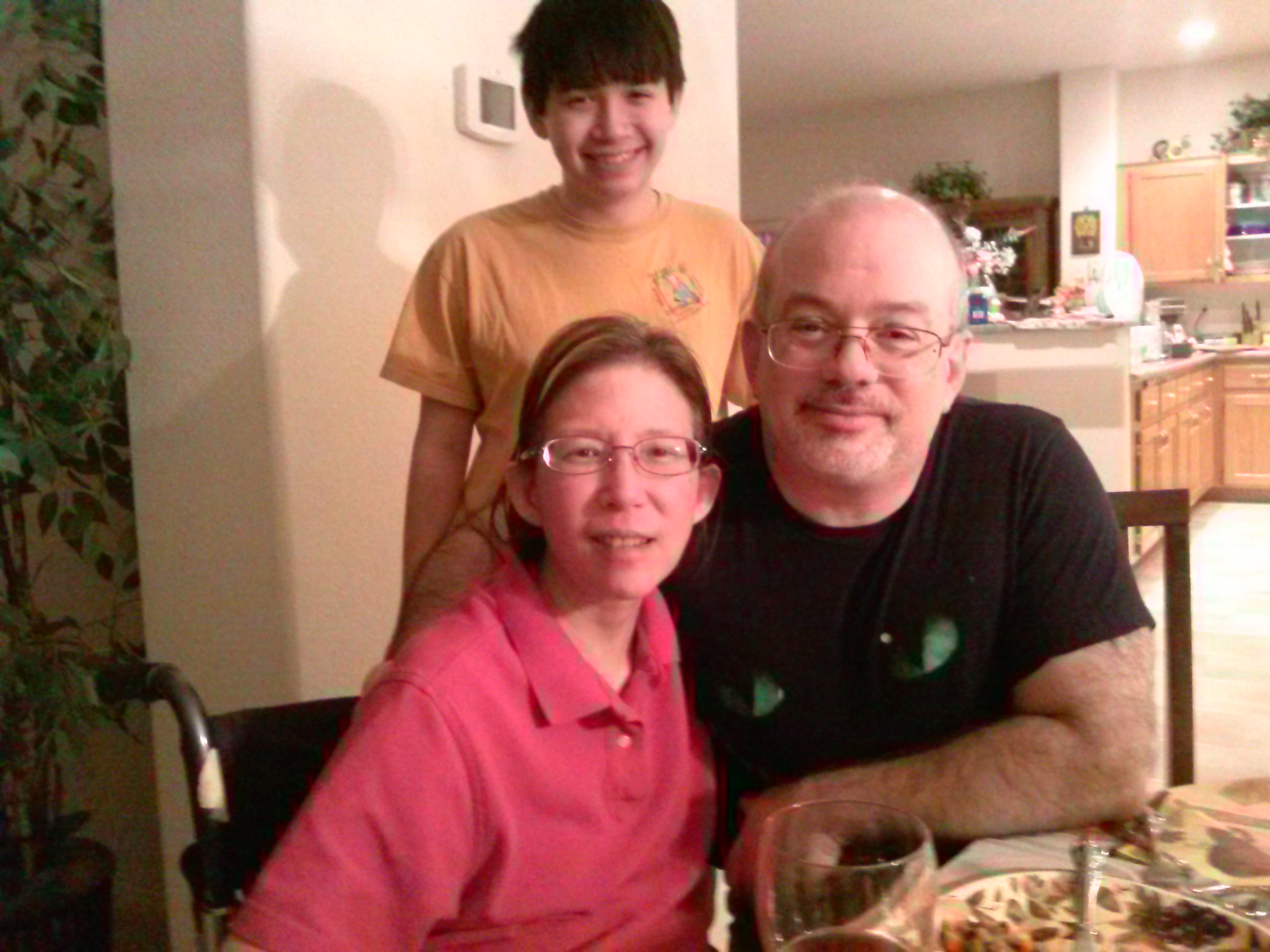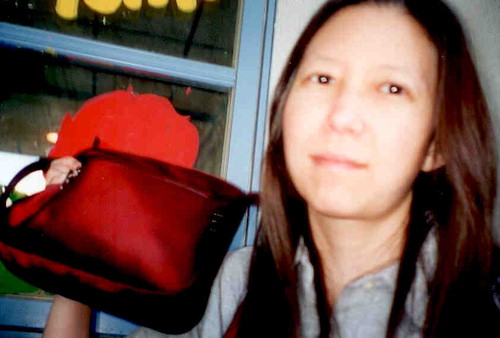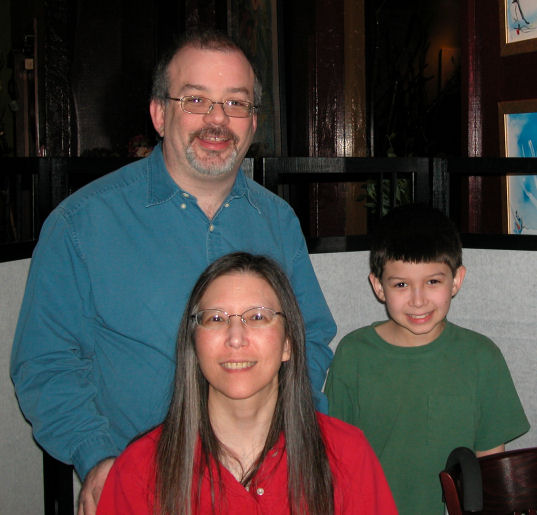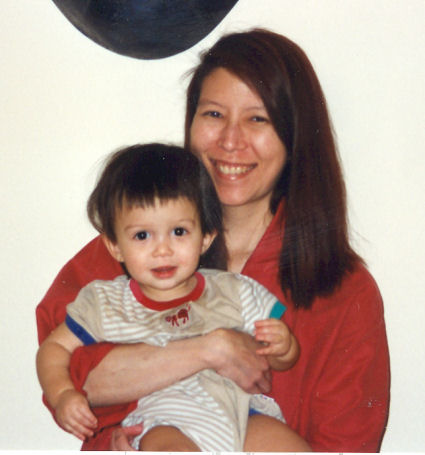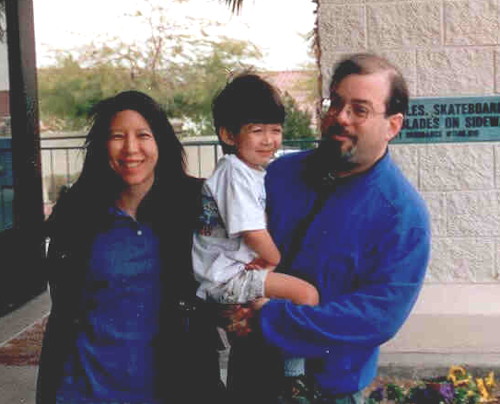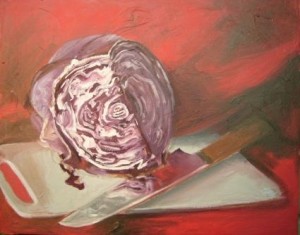Balls and Walnuts
more than you ever wanted to know
Category Archives: Mishpucha (mi familia)
It’s okay to say, “I love you”
I cross-posted this at Daily Kos, but thought hey, wouldn’t Karen want me to start writing again? Somehow, I know she would. With the increasing difficulty of our lives, I’d had less and less motivation to write. Partly it’s because that would be time away from Karen, partly because writing made me testy — if I was concentrating and she interrupted me, I could be a real shit to her. Hey, I once quoted that scene from The Shining when Jack gets pissy with his wife over her interruptions. So to keep from being such a shit to Karen, I found myself writing less and less.
Well, she’s gone now. No one here to be a shit to. Maybe I’ll start REALLY writing again — I think she would have liked me to do something constructive (with my grief, with my time here on earth, with everything).
Of course I never realized this would be the last photo we would take as a family. Karen died yesterday after a sudden and unexpected illness.
We weren’t the kind of couple who told each other “I love you” all that often. If anything, we were vaguely suspicious of couples who did say that all the time — as if they were so shaky in their commitment that they had to constantly reassure one another.
But we don’t respect how fragile life can be. If anything, being a doctor makes me even less aware, since I see so many examples of folks hanging on against all odds. And when life is gone, it’s too late to say all the things you want and need to say.
We met at Berkeley just before Christmas of 1982, and we became a couple just shortly thereafter. There was an almost instantaneous sense of belonging, of having found that one person who understood you and whom you could understand. I remember using the cheesy “soul mates” expression when we were courting. Some couples take years to get that reading-each-other’s-mind phase, but we were there pretty early on.
She developed multiple sclerosis in 1984, Christmas, so we had one year to build a relationship before we were tested by fire. It hasn’t been an easy thirty years, but whenever something new and terrible would happen, we could look back and remember all of the tough things we had worked through together.
I’m so angry at the hand life dealt my beautiful wife, but that is not the point of this diary.
She wasn’t a perfect person. No one is. But she was pretty damned awesome nonetheless. I miss her so much.
That’s our son Jacob in that photo. We conceived him against steep odds about 19 years ago. He’s such a wonderful young man — but that’s not the point of this diary, either.
So: life is fragile. It really is. So tell your children and your parents you love them. Most of all, tell your husbands and wives. Tell them all of the things you need them to know, even if you know they know it already. Say it out loud.
I love you, Karen.
D.
Teach your children well
Sunday evening Skype:
[5:04:35 PM] Jacob Hoffman: btw do you wash sheets like clothes or what
[5:04:35 PM] Douglas Hoffman: hot wash
[5:04:49 PM] Douglas Hoffman: they don’t shrink, so why not use the hottest setting
[5:05:21 PM] Douglas Hoffman: first time washing your sheets, eh?
[5:05:30 PM | Edited 5:05:40 PM] Jacob Hoffman: yes lol
(more…)
Tough. Old. Bird.
My father got through his four-vessel bypass today and (last I checked) he’s doing fine in the ICU — undoubtedly because my brother had been “sending him strength all morning.” (His words.)
Hmm. I am reminded of that study that showed that ill people who were prayed for actually did poorer than those not prayed for. Well, let’s hope my brother was only sending strength and not praying.
So the first hurdle is past. He still has five to seven days in the hospital, and a long rehab after that, but at least now he doesn’t have a time bomb in his chest. I’d say that I’m relieved (and I am), but the surgeon told him that most of the deaths occur post-operatively. He quoted him a 4-6% chance of dying after surgery. My father the gambler liked those odds.
Stay tuned.
D.
. . .
My niece Amanda died on Monday, unexpectedly. She had the flu and had stayed home from work; she had a fever, and that’s all I know. Her husband came home to find her dead. She leaves behind two small children.
You never expect this. Old people? Of course. Young people in accidents? I’m sure it’s just as much of a shock and every bit as horrible to the loved ones, but again, it’s something people have heard of. But for a young, healthy person to die from the flu?
The families are devastated. She was my brother’s only child, and I’m sure he’ll never be the same.
My sister and I will be driving down to Orange County this weekend to spend some time with them. In a perfect world we’d spend longer, but for a variety of reasons this is the best we can do. We’ve never been a very close family (despite what my mother might think), but we’re not so distant as to blow each other completely off at a time like this.
D.
A word about essay writing
One of my favorite essayists is former Harper’s editor Lewis Lapham (who, in his life since Harper’s, now edits Lapham’s Quarterly). Lapham’s essays often have a unique form of argument, stabbing at the thesis from multiple directions, convincing you of the thesis’s validity before the thesis has ever been articulated. By the time the reader finishes, he not only agrees with the thesis (usually) but has a deeper understanding of the topic; and if he does not agree, he still comes away with that same depth of knowledge.
I have always felt that this was the pinnacle of essay writing, the ideal to which the young author should aspire. When I home-schooled my son, knowing that he didn’t have the depth of knowledge that decades of scholarship brings, I simplified the format into one which would still stand him in good stead in college. Begin with your thesis paragraph, I told him, develop and prove it in the paragraphs which follow, and restate at the end; but, and here’s the kicker, your goal should be to augment the thesis with your arguments, and when you conclude, restate a thesis which is deeper than the one with which you began. Call it value-added essay writing.
Jake’s Theology teacher (a Jesuit, and therefore in my opinion NOT an intellectual lightweight) disagrees. Theology this year is a writing class more than anything else. All to the good. I asked Jake how he was doing, and he told me that the only thing the teacher red-lined was precisely the thing I had been teaching him all these years. I know what his teacher has in mind because he discussed this with us at Open House. He wants a very simple format: state your thesis, support it, restate it at the end. In other words:
Okra is a disgusting vegetable.
It’s slimy no matter how you cook it.
The taste in no way compensates for its inherent sliminess.
Hence, okra is a disgusting vegetable.
Whereas my ideal essay would run more like this:
Okra is a disgusting vegetable.
It’s slimy no matter how you cook it, and the taste in no way compensates for its inherent sliminess.
In many areas of the country, a child could easily get through the first twenty years of life without seeing, let alone tasting, an okra dish, while in other areas of the country, okra is as much a part of a weekly schedule as potatoes, onions, or carrots. Those people often develop a fondness for okra.
In other parts of the world, staple foods may include things that others find unacceptable and “disgusting” — blood, intestines, insects. Foods we find acceptable (poached egg, anyone?) might be similarly revolting to people living in those regions. The emotion of disgust in response to particular foods may have more to do with what the eater is used to than anything else. Never eat anything slimy? Then slimy is not a characteristic you associate with acceptable food.
Okra’s unacceptability to many Americans is thus not only an example of the diversity of dietary practices in the world, but also tells us a little something about human nature.
(Forgive the topic, you okra-lovers; I pulled that one out of the air. And I’m afraid I did not put much time into creating something that would stand in the same galaxy as Lapham’s essays, let alone the same room.)
The Theology teacher’s version is geared toward getting high marks on AP History or English essay exams. The SAT written exam almost certainly has similar grading practices. Considering how poorly most college students write at the undergraduate level, I suspect most college profs would be delighted to read a well executed version of the A, B, C, D, and therefore A essay. So there’s nothing at all wrong with this goal. It’s good writing. But it’s not great writing.
Okay, so maybe I was wrong in my attempt to get Jake to shoot for the stars. But I don’t think so. Because if you can write even a little bit like Lapham, you can easily modify your writing to suit the circumstances. I explained this to Jake this morning . . . hopefully he can excuse me for making him write with too much finesse.
D.
toddler vids
Here’s something I pieced together from our home movies, covering babyhood to first day of Kindergarten.
Sis, who is the blonde girl?
D.
Here’s a taste
I’ll have to see if I can figure out how to use my other movie-editing software to add a voice-over.
The pipe-smoking gent at the beginning of the clip is my uncle — I think this may be the only footage we have of him (inchage?) The older man and woman are my mom’s parents, and the young boy and girl are my brother and sister. The young woman is my mom, of course. This is all pre-me.
Highlights: the aforementioned bit with my grandfather and the fig; my grandmother putting a turban on my grandfather so that he can play Rudolph Valentino in The Sheik (I’m guessing here), my brother and sister playing with the hula-hoop (you know — for kids!) My brother always was the athletic one.
D.
Honestly, some people.
A month ago, my dad hadn’t even heard of a smart frame, and now he’s pestering me because I haven’t uploaded any new pictures lately.
I bought my folks a Ceiva following a rare instance of “must have!” (my pal Stan has one, and had bought one for his in-laws in order to share pictures of his daughter). Mailed it to them with specific directions not to open it until I got there, because I knew they wouldn’t be able to set it up. Turns out it wasn’t so difficult to set up; the hardest thing was finding the box in the first place. My dad forgot that I had sent it to him. Fortunately, he’d left it in the most logical place possible, beneath the computer.
So in response to his pestering, I’ve been uploading lots of the photos that I had posted to the blog over the last three years. Hopefully that will satisfy him and my mom. And if the pictures upload tonight, it’ll be a nice Mother’s Day present come morning.
And my son’s mother? She refuses to celebrate Mother’s Day. No slave to Madison Avenue she.
D.
Of editors and gunsels
From The Maltese Falcon, by Dashiel Hammett (1929):
“Another thing,” Spade repeated, glaring at the boy: “Keep that gunsel away from me while you’re making up your mind. I’ll kill him.”
The word “gunsel” made it into the script for the 1941 film with Humphrey Bogart, Sidney Greenstreet, and Peter Lorre. The various editors — Joseph T. Shaw for Black Mask, where the story was first serialized, and whomever Warner Bros. employed to parse scripts — apparently figured the word was slang for “gunman.” Has “gun” right there, don’t it? But in fact, “gunsel” was a brilliant sleight-of-hand showing why, when it comes to words, you should never screw with a writer.
Erle Stanley Gardner writes in “Getting Away with Murder,” The Atlantic, Vol. 215 No. 1 (1965):
Hammett wrote a story which contained an expression that gave Shaw quite a jolt. He deleted it from the manuscript and wrote Hammett a chiding letter to the effect that Black Mask would never publish vulgarities of any sort.
Hammett promptly wrote a story in which he laid a deliberate trap for Joe Shaw.
One of the characters in the story, meeting another one, asked him what he was doing these days, and the other shamefacedly admitted that he was “on the gooseberry lay.”
Had the editor known it, this meant simply that the character was making his living by stealing clothes from clotheslines, preferably on a Monday morning. The expression goes back to the old days of the tramp who from time to time needed a few pennies to buy food. He would wait until the housewife had put out her wash; then he would descend on the clothesline, pick up an armful of clothes, and scurry away to sell them.
Shaw had the reaction which Hammett had expected. He wrote Hammett telling him that he was deleting the “gooseberry lay” from the story, that Black Mask would never publish anything like that. But he left the word “gunsel” because Hammett had used it so casually that Shaw took it for granted that the word pertained to a hired gunman. Actually, “gunsel,” or “gonzel,” is a very naughty word with no relation whatever to a bodyguard, a gunman, or a torpedo.
(Full excerpt here.)
So what’s a gunsel? From Wiktionary,
gunsel (plural gunsels)
1. A young man kept for homosexual purposes; a catamite .
2. (street and prison slang) A passive partner in anal intercourse.
I first encountered that word in The Maltese Falcon, and all these years I assumed it meant a gunman, or a hired punk with a gun. I was going to use it today, and googled it merely to check the spelling. Imagine my surprise. And think of all the writers who use it as a synonym for “gunman,” propagating Hammett’s little joke for generations to come.
It’s stuff like this that makes it all worthwhile.
D.
